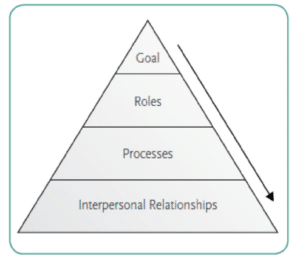Building a family team spirit
There are lots of business theories about the science of team building. My favourite (mainly due to its simplicity) is the GRPI model. According to this model, in order for a team to be effective, it needs these four elements:
- Goals, priorities and expectations which are clearly communicated
- Roles and responsibilities for every team member
- Processes and procedures for making decisions and getting the work done
- Interpersonal relationships which are high quality, trusting and flexible
Families are a lot like teams. At their best, families have a unique team spirit which creates a sense of belonging and unity and shared goals.
At their worst, it feels like everybody is pulling in different directions, one person is doing all the work and everyone is arguing all the time….
Which got me thinking. What could we learn from business to help family team building in our own homes?
Interpersonal relationships
Building a good relationship with your child is fundamental to creating a family team spirit. Two key elements are essential for building relationships: time and connection. Being a working parent does not mean you automatically fail on the time element. Spending small, frequent amounts of quality time with children doing something you both enjoy is the essential factor. Ten minutes in the evening wholeheartedly playing with your child is a real team booster and a great way to de-stress (see Why play is good for parents).
But family team building means thinking horizontally as well as vertically. The family team is not all about your relationship with your children. As every parent of more than one child knows, your children’s relationship with each other is a huge influence on family dynamics. If your children are bickering or fighting, everyone feels frazzled. So, as Team Manager, don’t tolerate constant sibling conflict. If you want to build a good family team tackle sibling conflict head on.
Kindness, affection and good communication all foster a strong sense of family connection. And, as every good leader knows, communication is a two-way process – so that means remembering to slow down and take time to listen to your children without directing, lecturing or jumping in with suggestions.
However, there are also key differences between work-based and family-based communication. Where at work communication is often planned and packaged into predetermined time slots (appraisals, one-to-ones, meetings), building a family team is far less efficient. Children often communicate poorly when put on the spot or pressurised at an allocated time – their shutters can go down or their brains are just focussed on other things. Communicating well with children involves waiting for the right moment to introduce a topic. Or for your kids to bring something up spontaneously (and usually while you are busy!). Communicating with teenagers, especially, involves a lot more water cooler chatter for a lot less getting to the point!
Processes
Prioritising informal communication channels doesn’t mean that structured processes and procedures in a family team are not important, they are. As family Team Manager (a.k.a. parent), there are huge advantages to using planned and agreed positive parenting strategies such as ground rules and logical consequences. Having clear and explicit rules and processes puts you in a great place as a parent as it takes the take the doubt and heat out of difficult moments. We set children up to succeed by telling them the rules in advance and applying those rules fairly and consistently.
Plus, not having to pluck discipline strategies from thin air when you are already losing your cool takes the stress out of parenting, reducing the chances of us resorting to shouting (which is a real killer for team spirit).
Roles
Being a parent is a role that brings uncomfortable emotions with it. We have to accept being unpopular with our children when we do things they don’t like (but which we know are in their best interests). And we have to learn to live with the uncertainty of never really knowing for sure whether the decisions we make are the right ones (whilst desperately caring whether they are right or not). The responsibilities and powers of a parents are sometimes hard to carry. But it is essential that we take them on and be the grown up in our team.
However, as every great leader knows, teams work best when the Team Manager is authoritative but not dictatorial. The power ultimately rests with parents. But we wield it best when we involve, engage and consult with all the team members. Children often have brilliant ideas to contribute to family problem-solving (see ‘How my pre-schoolers designed a stress-free morning routine). And although family team communications are inevitably less formal than work ones, family meetings can be a great method for consultation, problem-solving and information sharing.
And don’t forget that good teams share out responsibilities fairly (see 6 Reasons Your Children Should Do Chores). So teach your kids to be independent and to do things for themselves. Making a positive contribution and being a valued member of the family team are great ways to build children’s self-esteem. And if your teenager is a bit reluctant to step up to responsibilities, take a tip from the workplace and introduce a behaviour contract so that everyone knows what’s expected.
Goals
Having shared goals can be difficult when co-parents have different ideas on how to go about things or what really matters. If you are job-sharing the Team Manager role with a partner, there are going to be areas of conflict. When parents disagree about parenting, you need to find ways to talk constructively and problem-solve jointly so that both of you are pulling in the same direction. Decide what’s important and aim for a family culture that embodies the values you want to see.
You might also want to read: How to be a resilient family and How to have better weekends with children.







